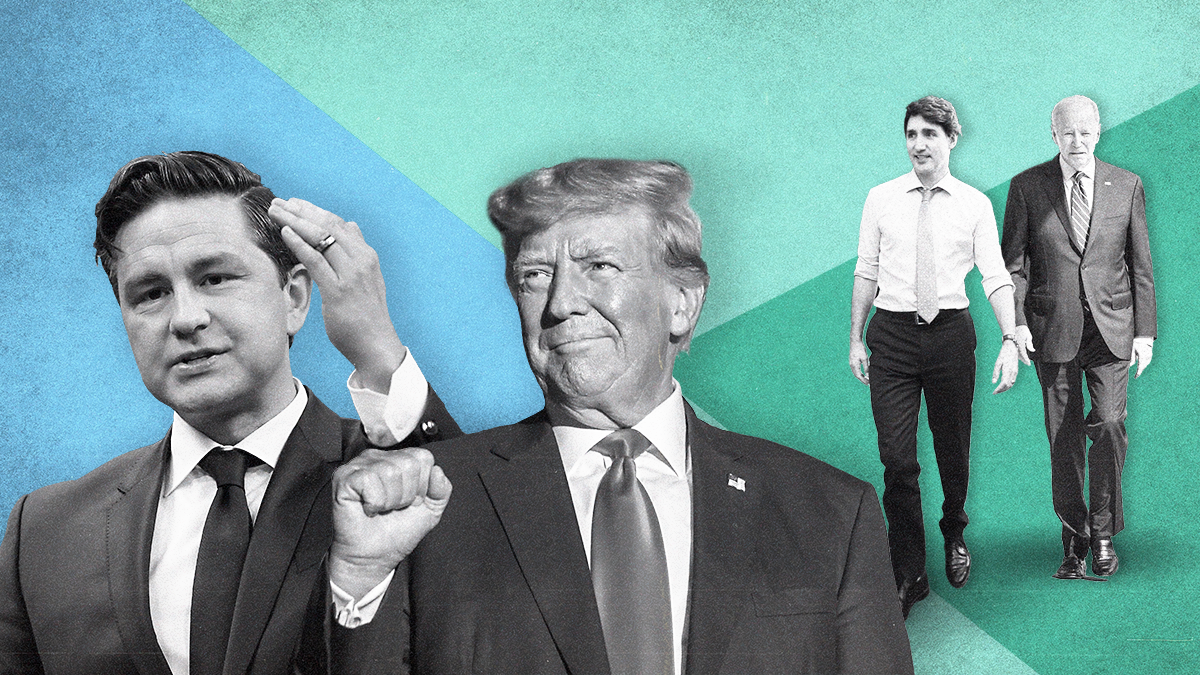Less than a year out from the US presidential election, concerns about Donald Trump’s potential return to the White House now include warnings of a possible slip into dictatorship. Last weekend, in the Washington Post, Robert Kagan wrote of a “clear path to dictatorship in the United States,” one that is “getting shorter every day.” Liz Cheney, a former Republican member of Congress and potential 2024 third-party presidential contender, echoed the concern, warning that the country is “sleepwalking into dictatorship.”
Meanwhile, north of the border, a desperate Liberal Party and Prime Minister Justin Trudeau, way down in the polls, are doing their best to paint their main rival, Conservative Party leader Pierre Poilievre, as a MAGA North incarnation of Trump, with everything that implies. As Politico reports, Trump’s influence over Canadian politics is significant, a potential “wild card” for Trudeau and a force that will shape the country’s next election, which is due by the fall of 2025 – but could come sooner.
MAGA-fying Poilievre
The Liberals have been working to tie Poilievre to Trump for months. They tested online attack ads ahead of an anti-Poilievre campaign back in November, and Trudeau claimed Poilievre was following Trump’s lead in abandoning Ukraine.
The logic of a Trump-Poilievre connection is simple. Trump is viewed poorly in Canada. The Liberals are drawing on Poilievre’s conservatism and faux-populism to cast him as a norm-busting, phony anti-elite politician hellbent on waging culture wars, demeaning the press, and attacking the country’s core institutions, such as the Bank of Canada and the Canadian Broadcasting Corporation.
So far, efforts to MAGA-fy Poilievre appear to be failing. The Conservatives are comfortably ahead in the polls by double digits, including two recent surveys – one by Abacus Data and one by Nanos Research – that found them ahead by nearly 20 points.
The Liberals are more than eight years into government and showing their age. And while they managed to come back from polling deficits ahead of the 2019 and 2021 elections – and retain government, despite winning fewer votes than the Conservatives – so far Poilievre has proven a stronger leader than either Andrew Scheer or Erin O’Toole, who led the Conservatives in the last two outings. Poilievre has better control over his caucus than his predecessors. His messaging and focus is on economic issues, particularly the housing crisis, and that resonates with Canadians.
Trump vs. Trudeau, Take Two
Americans worried about Trump 2.0 believe they are staring down a real threat to the republic. As CNN’s Stephen Collinson wrote earlier this week, Trump’s “increasingly unapologetic anti-democratic rhetoric” seems likely to foreshadow a threat to the country’s constitution and its checks and balances. There are fears he will stack appointments with cronies and ignore limits on presidential powers while finding willing accomplices in Congress and state legislatures. Will the man who refused to accept the 2020 election outcome accept 2024’s results if he loses? And, if he wins, will he leave quietly in 2028?
If Trump wins, the US might not be the only country in trouble. Trudeau may face Trump’s wrath – especially after being used as a punching bag ahead of the Canadian election. In 2020, John Bolton detailed how much Trump dislikes Trudeau, an account that rings true in light of how rocky the relationship between the two leaders was. Those years included awkward bilateral meetings, summit showdowns, rebukes over policy decisions including Canadian military spending, and an acrimonious renegotiation of the North American Free Trade Agreement. There is little chance the relationship will improve if Trump wins in 2024, and voters are taking note.
An October poll by Abacus Data found that Canadians believe Poilievre would better manage Trump than Trudeau – 37% to 28%. The polling firm’s CEO David Colletto explained to the Toronto Star that a Trump win would not necessarily boost Trudeau’s reelection chances, as Liberals seem to believe. He noted that respondents see Poilievre and Trump as sharing certain conservative affinities and perspectives. In this way, at least, Poilievre’s alleged proximity to Trump for them is seen as a potential asset.
What’s next?
Americans must consider what a Trump 2024 win would mean. Graeme Thompson, senior analyst at Eurasia Group, warns that observers may be discounting the possibility of it hurting US democracy.
“I think people are underestimating – as they did in 2016 – the odds that Trump wins the next election and the potentially dire consequences for the US republic that could entail,” he says. “The campaign itself is going to be brutal, and there’s a good chance that the losing side rejects the outcome, regardless of who wins.”
Canada must also prepare for a Trump win, and the Liberals will be doing so while trying to use the former president and the MAGA crowd as an anti-Poilievre cudgel – a strategy that may not even work. While Thompson reminds us that Canada is great at managing its relationship with its southern neighbor, “it will need that skill more than ever if it faces a second Trump presidency.” Moreover, the governing party might wish to rethink its strategy.
“If the Liberals are still in power,” he says “they would be smart to de-personalize the relationship as much as possible – that’s to say, make it transactional and interest-based, especially given the bad vibes between Trump and Trudeau.”
Unless something changes, given the current polling data, the Liberals, despite their best efforts, might not be around long enough to take that advice.


















